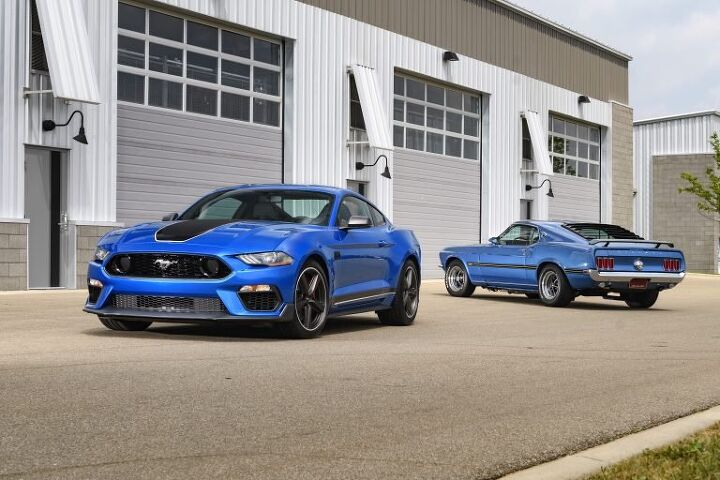Mustang Production Paused at Flat Rock Assembly

Ford will be idling Mustang production this week due to an insufficient supply of semiconductor chips. For all the talk the industry made about getting over supply chain hurdles in 2021, manufacturers continue citing insufficient access to microchips as the primary obstacle preventing them from enjoying more routine operations.
The automaker confirmed the move on Tuesday, explaining that Michigan’s Flat Rock Assembly will be down until sometime next week.
While the facility has a storied history with Ford’s relationship with Mazda, the site is now responsible for manufacturing the (real) Mustang. The Detroit News reported on the supply problem last night, explaining that these production issues are hardly unique to Blue Oval:
The production cut is just the latest signal that the shortage of the crucial component that powers many of the automated and electronic features in vehicles will continue to be a challenge more than a year after it started.
Toyota Motor Corp. said Tuesday that it is unlikely to reach its target of manufacturing 9 million vehicles this fiscal year through March because of the shortage, Bloomberg reported. The Japanese automaker plans to scale back production by about 150,000 units to 700,000 units in February, according to the outlet.
The semiconductor crisis emerged shortly after the pandemic in 2020 and was exacerbated by people staying home and purchasing small electronic devices using more-lucrative semiconductor chips. This resulted in an industry-wide shift away from vintage automotive chips offering narrower profit margins. Meanwhile, supply chains were in shambles following aggressive COVID restrictions — making it difficult for the Asian-based components to get into Western markets in a timely fashion.
This forced automakers to cut production and helped to create the empty lots that have encouraged dealerships to charged exorbitant fees for first and secondhand vehicles. Despite dealers making a relative killing from elevated demand, it’s estimated the situation has cost the global industry hundreds of billions of dollars in potential revenue. Analysts have stated that they’re expected the chip shortage to resolve itself by the end of 2022. But the same was said of 2021.
[Image: Ford Motor Co.]

A staunch consumer advocate tracking industry trends and regulation. Before joining TTAC, Matt spent a decade working for marketing and research firms based in NYC. Clients included several of the world’s largest automakers, global tire brands, and aftermarket part suppliers. Dissatisfied with the corporate world and resentful of having to wear suits everyday, he pivoted to writing about cars. Since then, that man has become an ardent supporter of the right-to-repair movement, been interviewed on the auto industry by national radio broadcasts, driven more rental cars than anyone ever should, participated in amateur rallying events, and received the requisite minimum training as sanctioned by the SCCA. Handy with a wrench, Matt grew up surrounded by Detroit auto workers and managed to get a pizza delivery job before he was legally eligible. He later found himself driving box trucks through Manhattan, guaranteeing future sympathy for actual truckers. He continues to conduct research pertaining to the automotive sector as an independent contractor and has since moved back to his native Michigan, closer to where the cars are born. A contrarian, Matt claims to prefer understeer — stating that front and all-wheel drive vehicles cater best to his driving style.
More by Matt Posky
Latest Car Reviews
Read moreLatest Product Reviews
Read moreRecent Comments
- ToolGuy TG likes price reductions.
- ToolGuy I could go for a Mustang with a Subaru powertrain. (Maybe some additional ground clearance.)
- ToolGuy Does Tim Healey care about TTAC? 😉
- ToolGuy I am slashing my food budget by 1%.
- ToolGuy TG grows skeptical about his government protecting him from bad decisions.


































Comments
Join the conversation
Renesas of Japan was THE major automotive chip supplier with a third of the global market until their factory caught fire last year. Took 'em months until the end of June to claim they were 100% back. That accounted for 8% of the shortage last year alone. The South Koreans knock out a few chips via a little outfit name of Samsung, but Taiwan is the real hub of major production. Not sure China is really right up there, but as they don't sit around and moan much like Western countries but get on with the job, no doubt they're rectifying the oversight after Huawei was dissed on 5G in the West. It used to be 'can do' was an American trait, but that was decades ago and seems to have died out. So far as the Mustang is concerned and since sedans and coupes don't sell very well, a coupla weeks of lost production isn't keeping Farley up at night.
My Dad bought a 4dr rear drive (79?) for me to drive in college and after. I drove it every day in Minnesota and it was a freak. At 40 below, I sat on the vinyl seat and it cracked around me. It had a carb but never had to crank more than a couple seconds before starting, even on the coldest nights. It ended up rusting out. I never had to deal with dealerships as I did my own maintenance. I do recall a survey from the 90s where Mitsubishi had the lowest ranked dealers. I had a stick so I never got stuck in the snow and it was a snowy couple of years in Minnesota.